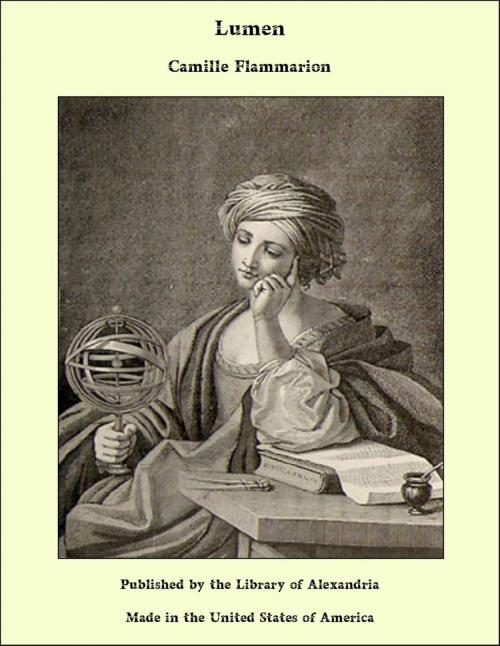| Author: | Camille Flammarion | ISBN: | 9781465610072 |
| Publisher: | Library of Alexandria | Publication: | March 8, 2015 |
| Imprint: | Language: | English |
| Author: | Camille Flammarion |
| ISBN: | 9781465610072 |
| Publisher: | Library of Alexandria |
| Publication: | March 8, 2015 |
| Imprint: | |
| Language: | English |
Quærens. You promised, dear Lumen, to describe to me that supremest of moments which immediately succeeds death, and to relate to me how, by a natural law, singular though it may seem, you lived again your past life, and penetrated a hitherto-unrevealed mystery. Lumen. Yes, my old friend, I will now keep my word; and I trust that, thanks to the life-long communion of our souls, you will be able to understand the phenomenon you deem so strange. There are many conceptions which a mortal mind finds difficult to grasp. Death, which has delivered me from the weak and easily-tired senses of the body, has not yet touched you with its liberating hand; you still belong to the living world, and in spite of your isolation in this retreat of yours amid the royal towers of the Faubourg St. Jaques, you still belong to the life of Earth, and are occupied with its petty distinctions. You must not, therefore, be surprised if, whilst I am explaining to you this mystery, I beg of you to isolate yourself still further from outer things, and to give me the mostfixed attention of which your mind is capable. Quærens. My one desire is to listen to your revelations; speak, therefore, without fear and to the point, and deign to acquaint me with those impressions, as yet to me unknown, which are experienced upon the cessation of life. Lumen. From what point do you wish me to begin my recital? Quærens. If you can recall it, I shall be pleased if you will begin at the moment when my trembling hands closed your eyes. Lumen. The separation of the thinking principle from the nervous system leaves no remembrance. It is as though the impressions made upon the brain which constitute memory were entirely effaced, to be renewed afterwards in another form. The first sensation of identity felt after death resembles that which is felt during life on awakening in the morning, when still confused with the visions of the night, the mind, wavering between the past and the future, endeavours to recover itself, and at the same time to retain the vanishing dreams, the pictures and events of which are still passing before it. At times when thus absorbed in the recollection of a delightful dream, the eyelids close, and in a half slumber the visions reappear. It is thus that our thinking faculty is divided at death, between a reality that it does not yet comprehend and a dream which has completely disappeared. The most conflicting impressions mingle in and confuse the mind, and if, overwhelmed by perishable feelings, a regret comes into the mind for the world that has been left behind, a sense of indefinable sadness weighs upon and darkens the imagination and hinders clearness of vision.
Quærens. You promised, dear Lumen, to describe to me that supremest of moments which immediately succeeds death, and to relate to me how, by a natural law, singular though it may seem, you lived again your past life, and penetrated a hitherto-unrevealed mystery. Lumen. Yes, my old friend, I will now keep my word; and I trust that, thanks to the life-long communion of our souls, you will be able to understand the phenomenon you deem so strange. There are many conceptions which a mortal mind finds difficult to grasp. Death, which has delivered me from the weak and easily-tired senses of the body, has not yet touched you with its liberating hand; you still belong to the living world, and in spite of your isolation in this retreat of yours amid the royal towers of the Faubourg St. Jaques, you still belong to the life of Earth, and are occupied with its petty distinctions. You must not, therefore, be surprised if, whilst I am explaining to you this mystery, I beg of you to isolate yourself still further from outer things, and to give me the mostfixed attention of which your mind is capable. Quærens. My one desire is to listen to your revelations; speak, therefore, without fear and to the point, and deign to acquaint me with those impressions, as yet to me unknown, which are experienced upon the cessation of life. Lumen. From what point do you wish me to begin my recital? Quærens. If you can recall it, I shall be pleased if you will begin at the moment when my trembling hands closed your eyes. Lumen. The separation of the thinking principle from the nervous system leaves no remembrance. It is as though the impressions made upon the brain which constitute memory were entirely effaced, to be renewed afterwards in another form. The first sensation of identity felt after death resembles that which is felt during life on awakening in the morning, when still confused with the visions of the night, the mind, wavering between the past and the future, endeavours to recover itself, and at the same time to retain the vanishing dreams, the pictures and events of which are still passing before it. At times when thus absorbed in the recollection of a delightful dream, the eyelids close, and in a half slumber the visions reappear. It is thus that our thinking faculty is divided at death, between a reality that it does not yet comprehend and a dream which has completely disappeared. The most conflicting impressions mingle in and confuse the mind, and if, overwhelmed by perishable feelings, a regret comes into the mind for the world that has been left behind, a sense of indefinable sadness weighs upon and darkens the imagination and hinders clearness of vision.















